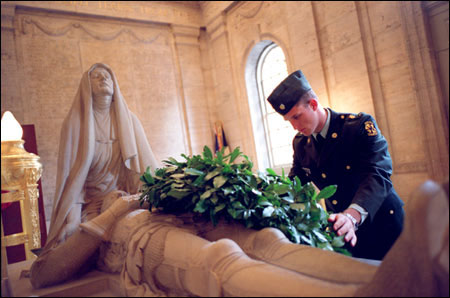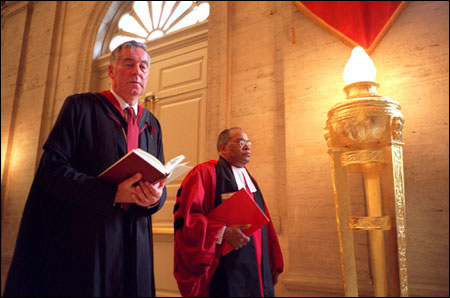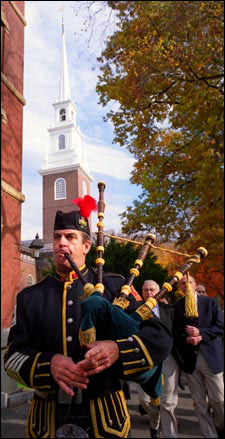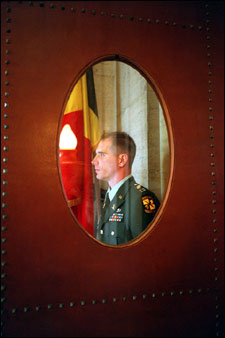Memorial Church marks anniversary with solemn remembrance


The Memorial Church marked its 70th anniversary Sunday (Nov. 10) with a solemn remembrance of those who died in World War I and in subsequent conflicts, and with a celebration of donors who helped make the church’s future more secure in the recent fundraising campaign.
Before a packed congregation, Sunday’s sermon reflected on the lives lost during World War I, in whose memory the church was built. The sermon was delivered by Eric Anderson, provost of Eton College in England and member of the Overseers Committee to Visit The Memorial Church.
Anderson said that the war proved a watershed in several ways. It marked the time when the United States stepped out to become a world leader, sending the New World to save the Old World. And it lifted the veil of heroism and glamour from war in a way that has proved permanent.

When men first marched to war in 1914, Anderson said, they could still believe it was a heroic adventure. Today, however, war is viewed much more realistically, as a struggle where combatants and noncombatants alike suffer deprivation, mutilation, and death.
World War I was so horrific, Anderson said, that it was dubbed “the war to end all wars.” In that, however, predictions proved too optimistic.
“The first world war was one of those rare historical moments when Western civilization saw war for what it is. Never before had war picked out for slaughter the brightest and best of an entire generation,” Anderson said. “The ‘war to end wars’ just turned out to be yet another chapter in the long, bloody struggle between human heroism and human cruelty.”
Anderson shared a personal memento of the war, reading a letter from his great-uncle to his great-uncle’s mother the night before the start of battle of the Somme, in which 600,000 British and French lost their lives, along with 450,000 Germans. Anderson’s great-uncle warned his mother, “We are in for some slight trouble,” so that he wouldn’t be able to “keep well back” during the battle as she advised. His body was never found.
The struggle between heroism and cruelty continues today, Anderson said, with the Sept. 11 terrorism attacks sending a new generation of youth off to fight. While that generation does its duty, he said, it is up to those who remain and who remember the war dead to work to make the world a better place.
“The Harvard men who died have no hands but our hands now, no energy but our energy … to ensure this world becomes a better place,” Anderson said. “We must not break faith with those who died.”
Besides Anderson’s sermon, Sunday’s service was steeped in memories from the church’s long history. The prelude music, “Variations on ‘Old 100′” and the anthem played during the service both date to the church’s past. The anthem was commissioned for the church’s 50th anniversary and “Old Hundredth” was a tune that commonly began services during the time of the church’s founding.

The service was marked by members of the Harvard ROTC, who laid a laurel wreath on the statue in the church’s Memorial Room. After the service, the congregation filed out of the church through the Memorial Room, giving them a chance to pass by the statue and the names engraved on the room’s walls.

The Rev. Professor Peter J. Gomes, the Plummer Professor of Christian Morals and Pusey Minister in the Memorial Church, said during the service and at a luncheon afterward, that the day was intended to honor the church’s past and look forward to a hopeful future.
“Those are the two notes we strike, solemn commemoration and hopeful and grateful anticipation,” Gomes said.
The service was followed by a celebratory luncheon, held to mark the successful completion of the church’s campaign last year. The campaign, which raised $8 million, for the first time helped secure programs and services inside the church, Gomes said. Among the positions secured by endowments created or enhanced by the campaign are that of the Pusey Minister and the University organist and choirmaster. Gomes, Harvard President Lawrence H. Summers, and former Dean of the Faculty of Arts and Sciences Jeremy R. Knowles spoke at the luncheon.
Summers thanked the donors for their generosity and thanked Gomes for his leadership. Since taking over as Harvard president more than a year ago, and guiding the University through the Sept. 11 tragedy, Summers said he has gained a new appreciation for the leadership role the church takes in the University’s spiritual life. Particularly striking was the ceremony that marked the first anniversary of Sept. 11, an event, he said, that drew thousands of students to the Yard before classes had begun and in which many more wished they’d participated.
“As much as the Memorial Church recognizes our past, it also contributes to shaping our future. That is why this is so important,” Summers said.




